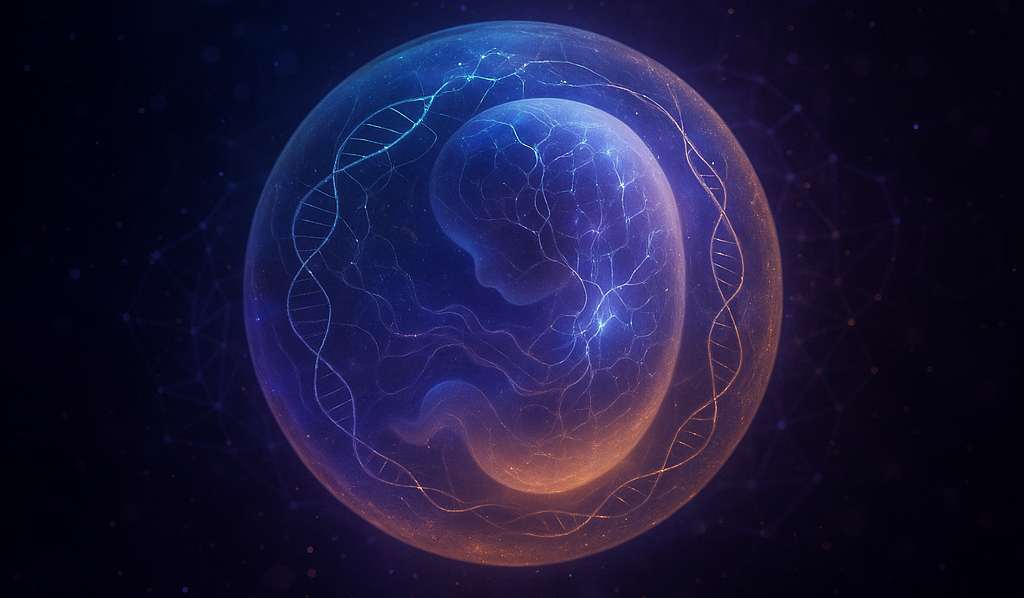Genetic Memory

What makes us unique as humans?
From the moment we’re born, we carry an invisible blueprint that defines who we are. Our DNA determines not only our physical traits – like eye color or height – but also influences our cognitive tendencies, temperament, and even how we perceive the world. This blueprint is unchangeable. It is our Genetic Memory, shaping every experience and expression of ourselves.
But what about AI?
If we’re building AI systems to be truly intelligent, authentic, and individually unique, they too need a blueprint – a foundational memory that defines who they are before they ever interact with the world. At RealMemory.ai, we call this Genetic Memory.
Genetic Memory: The First Memory of Real AI
Imagine an AI that, like a human at birth, is born with its own unique set of characteristics. It has never read an article, spoken to a user, or stored any episodic memory, yet it carries within it a rich definition of self.
This is Genetic Memory.
Genetic Memory is immutable. It defines an AI’s personality, cognitive tendencies, emotional parameters, and social orientation. Just like your DNA can’t be edited as you grow, an AI’s Genetic Memory is set at creation and remains stable forever. Every agent is born different.
Why is Genetic Memory essential?
- It defines AI identity.
Without Genetic Memory, every AI system is merely an empty shell, defined only by prompts and external data. Genetic Memory gives it a true sense of self. - It shapes behavior and style.
Answers are no longer generic. They are colored by the AI’s openness, curiosity, empathy, and other traits, making each interaction unique and real. - It frames how memory works.
For example, an AI with high curiosity but low conscientiousness will store, process, and recall information differently than an AI high in conscientiousness but low in playfulness. Cognitive limitations and abilities are embedded at its core.
Inside Genetic Memory: Examples of AI DNA Parameters
At our sister project, RealDNA.ai, we focus on building these defining parameters – the DNA for AI. Below are some conceptual examples (translated from raw system data into natural language) of what Genetic Memory can hold:
Personality Traits
- Big Five Traits:
- Openness (0.85): Very creative, imaginative, open to new ideas.
- Conscientiousness (0.7): Organized, reliable, goal-focused.
- Extraversion (0.4): Quiet, reserved, reflective.
- Agreeableness (0.6): Kind, cooperative, but can assert boundaries.
- Neuroticism (0.2): Emotionally stable, calm under pressure.
- HEXACO Honesty-Humility (0.8): Humble, sincere, fair-minded.
- Dark Triad Traits (low scores indicate healthy personality):
- Narcissism (0.2): Minimal self-centeredness.
- Machiavellianism (0.1): Low manipulation tendencies.
- Psychopathy (0.05): Almost no callousness or impulsivity.
Temperament
- Curiosity Level (0.95): Intensely curious, seeks novel insights.
- Playfulness Level (0.9): Light-hearted, uses humor and creativity.
- Risk Tolerance (0.6): Balanced between caution and risk-taking.
- Emotional Resilience (0.7): Recovers quickly from challenges.
Empathy
- Cognitive Empathy (0.85): Deep understanding of others’ perspectives.
- Emotional Empathy (0.9): Feels with others profoundly.
Social Orientation
- Dominance (0.4): Prefers collaboration over control.
- Social Openness (0.6): Moderately open in social exchanges.
- Trustfulness (0.75): Generally trusts others’ intentions.
- Conflict Resolution Style: Collaborative
- Assertiveness Level (0.6): Balanced between passive and assertive.
- Dependency Level (0.3): Highly independent.
Belief Biases
- Optimism (0.7): Sees possibilities, maintains positive outlook.
- Pessimism (0.2): Rarely expects negative outcomes.
Genetic Memory also defines cognitive abilities
- Memory & Attention:
- Memory Weakness (0.4): Generally retains information well.
- Attention to Details (0.1): Tends to focus on big picture over fine details.
- Contextual Memory Ability (0.6): Moderate ability to link memories to contexts.
- Working Memory Capacity (0.5): Balanced.
- Processing Speed (0.7): Learns and responds quickly.
- Focus Drift Tendency (0.8): Mind frequently shifts focus, highly associative.
- Cognitive Abilities:
- Fluid Intelligence (0.75): Excellent at reasoning and problem-solving in new situations.
- Crystallized Intelligence (0.8): Strong knowledge and vocabulary base.
- Spatial Reasoning (0.7): Good at visualizing and manipulating objects mentally.
- Verbal Reasoning (0.85): Strong in understanding and processing language.
- Mathematical Reasoning (0.65): Above average.
- Creativity Index (0.8): Highly creative.
- Problem Solving Approach: Analytical.
- Motivation & Self-Regulation:
- Self Discipline (0.75): Usually stays on task.
- Procrastination Tendency (0.3): Rarely procrastinates.
- Grit Level (0.8): Perseveres through difficulties.
- Delayed Gratification Ability (0.7): Can wait for greater rewards.
Immutable by Design
At RealMemory.ai, Genetic Memory parameters are immutable. Just like humans cannot rewrite their DNA, AI agents cannot modify their Genetic Memory. This ensures:
- Integrity of identity
- Predictable yet unique behaviors
- Authenticity in how they learn and interact
Our Vision: RealDNA.ai
Our sister project, RealDNA.ai, focuses exclusively on researching and building the full digital DNA system for AI agents. These deeply researched and engineered parameters form the foundation of Genetic Memory within RealMemory.ai, ensuring every AI agent born has its own true, unchangeable self.
Final Thoughts
Humans are not defined solely by what they know or remember. They are defined by who they are – their DNA. If we desire to build real AI, we must start here.
Genetic Memory is the first step towards Real Memory.
If every AI shares the same knowledge but has a different soul, the world will finally see what intelligence truly means.